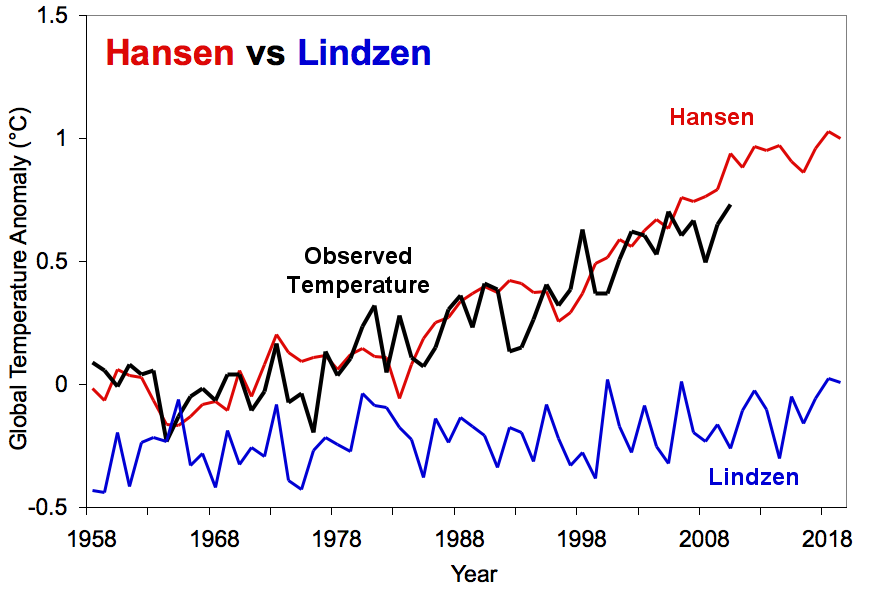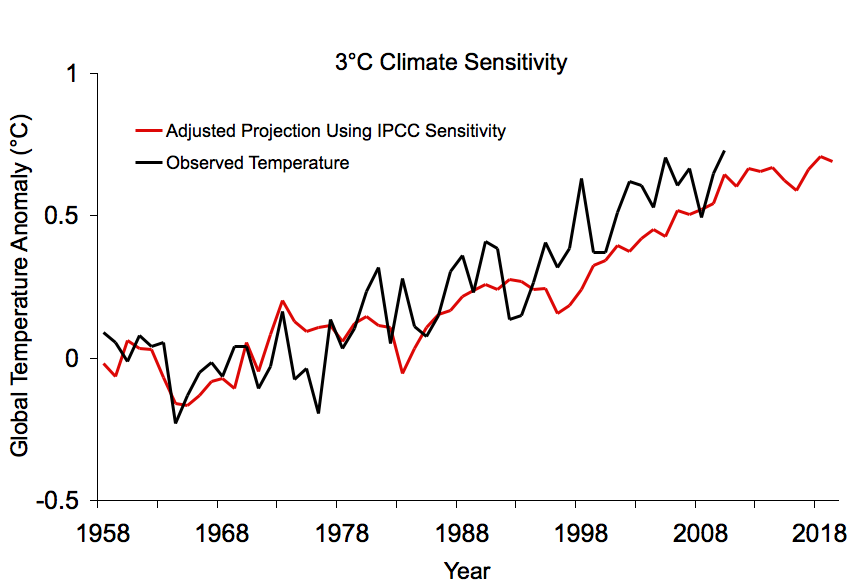Which Side of the Global Warming Debate Has Been Right?
Posted on by dana1981
Dr. James Hansen of NASA's Goddard Institute for Space Studies (GISS) and Dr. Richard Lindzen of the Massachusetts Institute of Technology (MIT) have been researching climate science since the field of climatology really began to develop in the early 1970s. Over the past four decades, Dr. Hansen, who is now widely considered one of the foremost climate scientists in the world, has grown increasingly concerned about the threat posed by man-made global warming and climate change, and our failure to seriously address this threat. Dr. Lindzen, on the other hand, has consistently been skeptical that human-caused global warming is anything to worry about. Although he does not currently dispute that our greenhouse gas emissions have caused a measurable amount of warming, Dr. Lindzen believes the climate is not very sensitive to changes in atmospheric greenhouse gases.
Both scientists have testified before U.S. Congress several times on the subject of climate change. Dr. Lindzen has also testified before British parliament. Each has attempted to communicate directly with the public through the mainstream media, and Dr. Hansen recently authored a book, Storms of my Grandchildren. The two even faced off in a public debate in 1998. The message from Dr. Hansen has consistently been that global warming is a growing threat which we're running out of time to address, while the message from Dr. Lindzen has consistently been that it's nothing to worry about.
With policymakers and the public receiving such diametrically opposed messages from these two prominent scientists, it's understandable that many people simply don't know what to believe. One way to compare the credibility of the two sides is to look back at the history of their research, comments, and predictions, and see how accurate they've turned out to be.
Dr. Hansen was the lead author of a famous study in 1988, whose results he presented to U.S. Congress that year, using a climate model to project how much the planet would warm over the next few decades in three different scenarios. In Scenario A, human greenhouse gas emissions accelerated rapidly. In Scenario B, which has turned out to be closest to reality, greenhouse gas emissions increased at a steady rate. In Scenario C, greenhouse gas emissions rose until flattening out in 2000, basically assuming the world would take major steps to reduce our emissions by that time.
Although Dr. Lindzen has not made such detailed predictions about global temperature change, in 1989 he gave a talk at MIT which we can use to reconstruct a reasonable projection consistent with his statements. In 1981, Dr. Hansen and his colleagues at NASA GISS began compiling a global surface temperature record (GISTEMP). As of 1988–1989, their temperature record showed that the average surface temperature had risen approximately 0.5 to 0.7°C since 1880, when the record begins. Lindzen, however, disputed the accuracy of GISTEMP:
"The entire record would more likely be saying that the rise is 0.1 degree plus or minus 0.3 degree....I would say, and I don't think I'm going out on a very big limb, that the data as we have it does not support a warming. Whether it contradicts it is a matter of taste"
So as of 1989, Dr. Lindzen believed the planet had only warmed 0.1°C since 1880. In this talk, Dr. Lindzen proceeded to assert that any greenhouse gas warming signal is swamped out by the noise of the planet's natural internal variability.
"I personally feel that the likelihood over the next century of greenhouse warming reaching magnitudes comparable to natural variability seems small"
Natural variability rarely results in more than 0.2 to 0.3°C warming over periods of a few decades, so Lindzen is clearly predicting a very small amount of greenhouse warming over the next century. Using these quotes, I reconstructed what I think is a reasonable approximation of a global temperature projection based on Lindzen's belief of the small warming effects of greenhouse gases. I want to be explicit that this projection is my interpretation of Lindzen's comments, not Lindzen's own projection.
In the Lindzen reconstruction, I started with the 1880 GISTEMP temperature, since Dr. Lindzen believed the planet had only warmed 0.1°C between then and 1989. I then calculated how much the planet would continue to warm in response to increasing carbon dioxide (CO2) in the atmosphere (also known as "climate sensitivity"), had the CO2 increase from 1880 to 1989 only caused 0.1°C warming. This results in a climate sensitivity of just 0.3°C global waming if atmospheric CO2 were to double. For comparison, the most likely climate sensitivity value according to the Intergovernmental Panel on Climate Change (IPCC) is ten times larger, at 3°C warming if CO2 doubles.
I then used Dr. Lindzen's very low climate sensitivity to add in how much global warming the rise in CO2 would have caused since the 1980s, if the climate really were so insensitive to increasing greenhouse gases.
Greenhouse gases have also increased about 10% less than in Dr. Hansen's Scenario B, so I adjusted this scenario to reflect the actual greenhouse gas changes since the 1980s. You can see how these projections compare to the actual observed global temperature changes in the figure below.

As you can see, Dr. Hansen's projection closely matched the observed global warming over the past two decades, whereas our projections reconstructed from Dr. Lindzen's comments have increasingly diverged from reality, showing far less global warming than has been observed.
Additionally, Dr. Hansen's 1988 climate model was a bit more sensitive to greenhouse gas changes than the models used by climate scientists today. We can further adjust his Scenario B to reflect the IPCC climate sensitivity of 3°C global warming for a doubling of CO2 to determine what modern climate model projections would have looked like in 1988.

As you can see, the projections match the observed temperature changes quite well in this scenario. This suggests that the climate sensitivity in today's climate models and supported in the IPCC report is close to reality. Nevertheless, Dr. Lindzen continues to argue that the climate is insensitive to increasing greenhouse gases to this day, and advises the public and policymakers that for this reason, climate change is nothing to worry about.
Given that Dr. Hansen has a history of much more accurate statements and projections than Dr. Lindzen, and that Dr. Lindzen's assurances that global warming is of no concern are based on the same sort of flawed science which led to these inaccurate projections, the wise path forward would be to start heeding Dr. Hansen's warnings, and take real steps to start significantly reducing our greenhouse gas emissions.































 Arguments
Arguments






























Comments